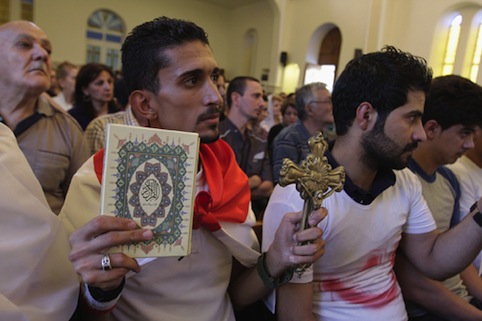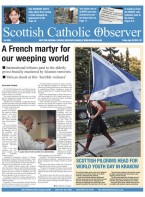July 29 | ![]() 0 COMMENTS
0 COMMENTS ![]() print
print

Hope lives amid destruction of war
More than 12 million people have been displaced by conflict in Syria, but gloom is not universal
By FR GHASSAN SAHOUI
The conflict in Syria has displaced more than 12 million people – 3.8 million to neighbouring countries – and resulted in more than 220,000 deaths. More than half of the Syrian population are in need of assistance. About 242,000 Syrians currently live in areas besieged by the government or opposition forces.
JRS Middle East is a region of the Jesuit Refugee Service, an international Catholic organisation sponsored by the Society of Jesus. Initially established in the Middle East to meet the needs of Iraqi refugees, JRS regionally now works predominantly with Syrians, both inside and outside Syria.
It offers a wide range of services: emergency support in the form of food aid, shelter, non-food items, hygiene kits and basic medical support to people with chronic and terminal illnesses. Other services include educational and psychosocial support, especially to Syrian children, legal and medical referrals, family visits, and small livelihood projects. In total, JRS serves more than 490,000 people in Syria and Iraq.
Nowadays, when I think that I was living in Homs and then in Aleppo, a city among the most dangerous in the world, where we were in great danger at every moment, I say to myself it was really madness!
Mortars, bombs and rockets fell in a random manner on our neighbourhoods. However, since the regular army intensified its offensive against armed rebels, we are subjected to daily bombardment from them, causing many victims serious injuries, as well as immense damage to buildings.
It is primarily for this reason that Aleppo continues to lose its population, especially its Christians. Five years of war have broken the determination of many families, pushing them to start a new life elsewhere. There were almost 130,000 Christians living in Aleppo before the crisis. Now there remain probably 30,000. Most of those who have stayed are constantly faced with the nagging question of whether to go into exile or not. A helpful answer for those who stay is the information they get from some recent immigrants, expressing dissatisfaction in the countries where they are exiled.
The people of Aleppo who continue to survive demonstrate an extraordinary resilience, some adapting, others accepting their fate without lamenting and almost all have become fatalistic. They continue to go about their business or walk the streets even when shells fall. Our relationship with death seems indescribable. We live with it in a certain way, we wait for it every minute, as scary as that sounds.
But it also has good sides: we live every minute of our life as though it were the last, we try to enjoy it. It is true that we have learned to avoid any future plans, but we do not stop dreaming and praying that peace can return one day.
What makes life even harder in Aleppo are the endless worries that people endure every day to ensure basic needs, such as water, fuel and electricity, are met. Indeed, daily life is punctuated by the search for the satisfaction of these needs. Some manage to buy the electric current supplied for a few hours a day, depending on their budget.
Unfortunately they can find that water is completely cut off for days or weeks, and this water they have to fetch for themselves. As for oil, finding this in the winter becomes a main occupation for the people.
In these difficult conditions, what does our mission become? Living in solidarity with the people, helping to relieve them of some of their suffering, rekindling the embers of their hope in this seemingly unending dark tunnel. This is roughly what the Jesuit Refugee Service in Aleppo does, tirelessly, every day. More than 160 Christian and Muslim volunteers, Arabs, Kurds and Armenians work together in a beautiful atmosphere of friendship and without any difficulty, in collaboration with several other humanitarian organisations to help more than 10,000 families, nearly 60,000 people in all.
Most of these people are Muslims who fled their neighbourhoods because of the fighting. As for the Christians (about 600 families) who receive this aid, most of them are affected economically by the crisis.
Our organisation provides them with every kind of service: food, clothing, hygienic materials, medication and surgical procedures, as well as psychosocial activities especially for women (we have a sewing shop which gives them paid work) and we provide also for children with autism.
A recent project with a well-known institute in the city helps hundreds of young people to gain good vocational training to help them in finding a job. There is, alas, a frightening growth in unemployment.
Other projects we support, as Jesuits, are meant firstly for families who unfortunately have fewer resources with the exorbitant increase in prices, so that they can spend and survive with some dignity. Our effort also focuses on university students, offering them scholarships and a quiet space, with lighting and heating, so they can concentrate on their studies.
Providing company, consoling, making them smile, giving hope and comfort to the people who are desperately in need in these unprecedented circumstances – that is more or less what we try to do every day.
Sometimes it is not easy. The scale of need is so great that we can feel completely helpless. However thanks to the tender and infinitely merciful gaze of Him who became for us poor and naked, hanging on the Cross of the inhuman madness of evil, despair does not find a way to our hearts, and we continue with love and enthusiasm. He has deemed us worthy to share in His mission. And we would not have been able to do what we are undertaking without the kindness of all those who are generous to us with their prayers and donations.
Most of the refugees we serve are Muslims. And as Pope Francis reminds us, it doesn’t matter to what faith a person belongs, a refugee is my brother or my sister; I need to reach out to that person in tangible ways.
Fr Ghassan Sahoui is a Jesuit from Syria, where he has been director of the Jesuit Refugee Service in Aleppo. He has been visiting St Mary’s, Inverness, and will be working within the Highland Deanery until late August. To find out more about the work being done for refgees in Syria, or to make a donation, see www.jrsmena.org











